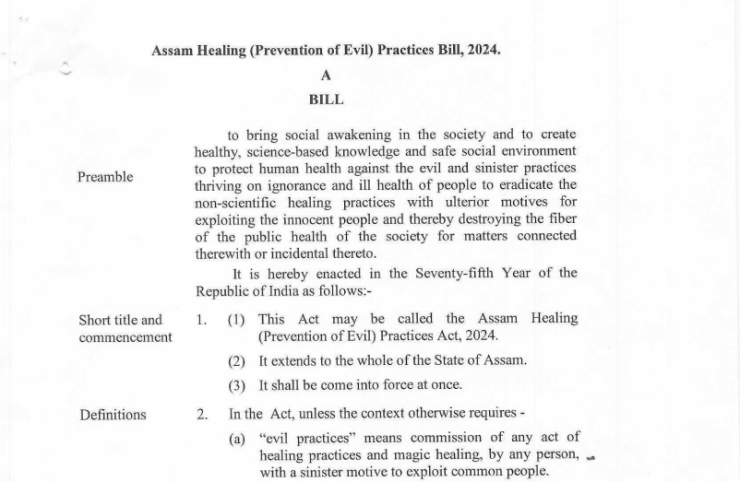
A Baptist church leader has become the first person to be imprisoned under Assam’s recently enacted law against ‘magical healing.’
Pranjal Bhuyan, 38, from the historic 126-year-old Golaghat Baptist Church in Dergaon town, was arrested on Friday, November 22, and produced before the Chief Judicial Magistrate of Golaghat on Saturday, where he was remanded to 14-day judicial custody. The allegation against Bhuyan is that he attempted to convert Hindus through what authorities describe as ‘magical healing practices.’
The arrest marks the first enforcement of the Assam Healing (Prevention of Evil) Practices Act, which received the governor’s assent on March 14, 2024. Under the new legislation, ‘evil practices’ are defined as ‘commission of any act of healing practices and magic healing, by any person, with a sinister motive to exploit common people.’
Police have filed multiple charges against Bhuyan, including sections of the Bharatiya Nyaya Sanhita and Section 6(a) of the new healing legislation. If convicted, he could face imprisonment of up to one year for a first offence, extendable to three years, along with a potential fine of Rs 50,000.
According to church pastor Amit Sangma, Bhuyan had been providing tuition classes to village children at his residence in Padmapur village. Local sources indicate that several months ago, villagers held a meeting where it was decided to prevent children from attending these classes, amid allegations that Bhuyan was teaching Bible studies during the sessions.
The Assam Christian Forum (ACF) has strongly condemned what they term the ‘wrongful arrest’ of their church member. ACF spokesperson Allen Brooks argues that the law unfairly targets the Christian community and restricts religious freedom.
Speaking to Christian Today, Brooks said, “This law effectively criminalizes the fundamental act of praying for someone’s wellbeing. What we’re witnessing is not just an attack on religious practices but an attempt to redefine prayer itself as a criminal act. The Christian community has been serving Assam for over a century through education and healthcare, yet today we find ourselves having to defend our basic right to pray,” Brooks emphasized that there is no concept of ‘magical healing’ in Christianity.
Brooks also highlighted the historical contribution of Christian missionaries to education in Assam, noting that they established the region’s first school in 1840.
“Look at our history in Assam - we’ve been running schools and hospitals since 1840. If mass conversion was ever our intention, wouldn't the demographic picture be dramatically different today? The fact that Christians remain less than four percent of the population after nearly two centuries speaks for itself,” Brooks pointed out.
The case has emerged amid growing tensions over religious conversion in the state. In a separate incident earlier this year in September, Mizo gospel singer Bethsy Lalrinsangi and her husband, evangelist C. Lalhriatpuia, faced legal challenges over alleged forced conversion activities in Assam’s Kokrajhar district.
The couple had conducted a gospel meeting at Mount Olive School in Debitola, where they were accused of coercing children into religious conversion through prayers. While initially denied bail by the Kokrajhar District Court, they were later granted interim bail by the Guwahati High Court on October 9. Justice Arun Dev Choudhury had directed them to appear before Assam police within ten days for statement recording.
The new healing practices law, introduced by Chief Minister Himanta Biswa Sarma’s BJP government, classifies violations as cognizable and non-bailable offences. The legislation alleges that it aims to promote science-based knowledge and create a safe environment for public health, while ending what it terms as ‘evil and sinister practices’ that exploit ignorance and ill health.
Archbishop John Moolachira of Guwahati, who serves as the ACF president, has expressed serious concerns about the law’s implications. Speaking to the media, he warned that under current provisions, individuals could face arrest merely for praying for their relatives, arguing that prayer is a universal practice that shouldn't be conflated with proselytization.
Christians comprise 3.74 percent of the state's 31 million population, notably higher than the national average of 2.3 percent. The ACF has called upon the government to reconsider the legislation and ensure constitutional rights are protected for citizens of all faiths.




